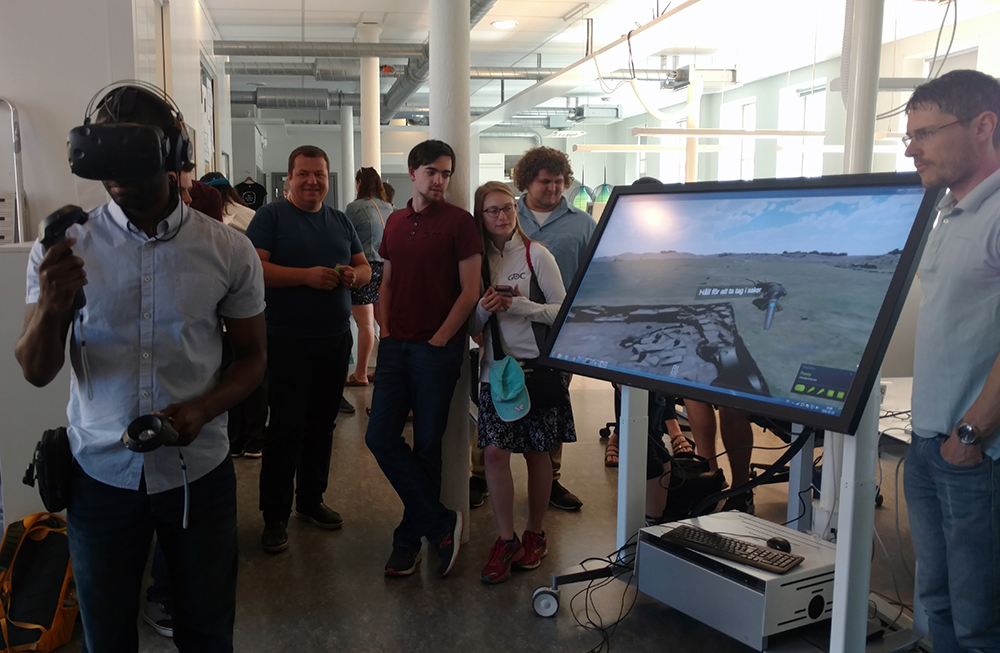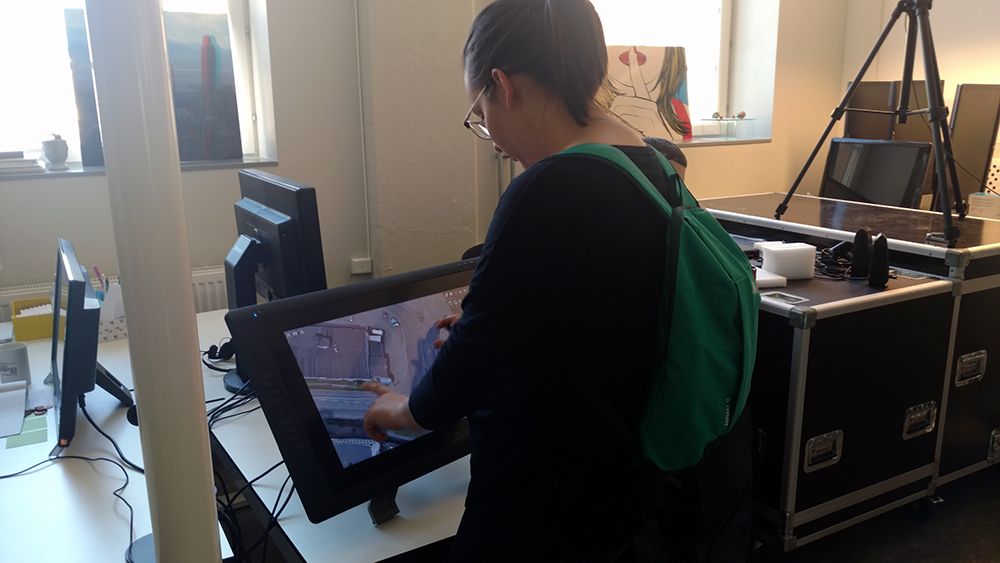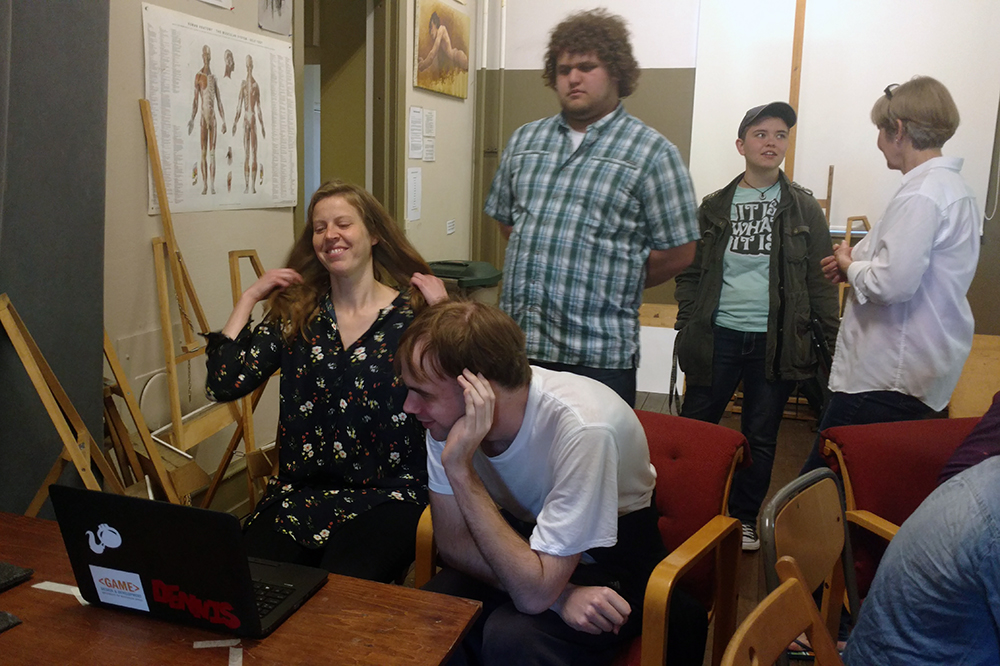University of Wisconsin-Stout senior Nathan Merrill never thought he needed to travel abroad, assuming he could learn about other cultures online.
Merrill, of Oshkosh, a psychology major, was one of 23 students who traveled to Sweden May 12-31 as part of the faculty-led program Entrepreneurship in Gamification, which was a condensed and specialized pilot version of a senior capstone course in entrepreneurship. The program was developed and led by Mary Spaeth, assistant professor of international business and entrepreneurship, as well as Diane Christie, professor and program director in computer science.
“It got me out of my comfort zone,” Merrill said. “It forced me to get creative with the resources I had. It just expanded my understanding of how a different culture operates.”
As part of the trip, students participated in 24 events in six cities, including visiting four of the best game-related companies in the world: Massive Entertainment, White-Wolf Publishing, Paradox Interactive and DICE-Entertainment Arts.
Students came from majors in management, marketing, computer science, math, game design, psychology and art, Spaeth said. They worked in seven teams that created seven business concepts as part of the course. “This was an ideal opportunity to make entrepreneurship a cross-disciplinary pilot project,” Spaeth said.

As students learned about integral parts of the gamification industry and about each other, teams produced 25-page business plans for concepts they’d proposed before leaving Menomonie. Some were projects in progress from game design courses; others were brand new ideas. All of them employed some aspect of gamification, a broad term used to describe using gaming concepts of rewards or points to increase use or participation.
“I wanted students to engage with others outside their silos and learn how each one of them might play a role within a particular business in industry where gamification was relevant,” Spaeth added. “The lack of communication within businesses and academia across disciplines can create barriers. Talking across disciplines and learning each other’s jargon builds understanding and inspires innovation.”
Christie said the trip helped show students how collaboration is a key to success in business. “We wanted students to see how what they do fits in the world and gives them that bigger picture,” Christie said. “Business depends on a lot of people with different areas of expertise to work together toward a common goal. This forced them to have to mix and talk about things they normally wouldn’t have to consider.
“It got students out of their comfort zones, which is a good thing,” Christie said. “We live a sheltered life in Wisconsin. They got to meet and work with students at Linkoping University from Russia, India, Columbia, Poland, Sweden and Denmark. They got a good flavor for different cultures.”

Special experiences
Besides corporate and business incubator visits and sightseeing, students traveled to the Swedish Academy of Realistic Art, a small college devoted to drawing. They participated in 90 minutes of figure model drawing, which for most of them was a first. “We wanted to have business students understand the craft and time it takes for artists to produce artwork in this industry,” Spaeth said. “Everything we did was to encourage an appreciation of each other’s value both professionally and personally.”
Joseph Matzelle, a UW-Stout computer science-game design and development junior, showed some of the art students at the Swedish Academy how a Star Wars game is built. Matzelle told the students the gaming industry needs talented illustrators.
Matzelle learned that computer science students in Sweden had vast portfolios that could be viewed on mobile devices. One of his goals is to create such a portfolio.
He was attracted to the trip to see some of the leading game design companies but found he really enjoyed the Swedish Academy of Realistic Art. “They were all committed to their work,” Matzelle said. “All day they are dedicated to realistic drawing.”

Traveling and working with students in other disciplines helped him understand the importance each part plays in a business. “It was a proper academic buffet,” he added.
Merrill, a Menomonie City Council member, said when he graduates he wants to become an entrepreneur in youth development programs. He first found out about the Sweden trip after the 3 Day Start Up program hosted by UW-Stout’s Discovery Center and the College of Science, Technology, Engineering, Mathematics and Management, which ignited his interest in entrepreneurship.
His group’s business plan is to create an application that would allow people to create music collaboratively with others over the web, based on how they are feeling. The 3 Day Startup program, which Spaeth has co-facilitated on four university campuses including UW-Stout, encourages students to start businesses by attending a long, weekend seminar on campus. It is an international program started 10 years ago. Hundreds of programs have been hosted on 180 college campuses around the world, resulting in more than 135 startup companies.
Having Spaeth, who lived in Sweden for 13 years and has dual U.S./Swedish citizenship, lead the trip to Sweden was a coup, Merrill said. “One of the greatest benefits of the trip was Mary, who knew the culture of Sweden inside and out,” he said.
###
Photos
UW-Stout student Jonathan Williams tests a virtual reality program while on a trip to Sweden that included 22 other students. The trip was designed to encourage students to talk across disciplines and learn from each other to build understanding and inspire innovation.
UW-Stout student Leslie Murphy works on a touch screen program at Rise Interactive.
UW-Stout students show students from the Swedish Academy of Realistic Art how to program a video game.




